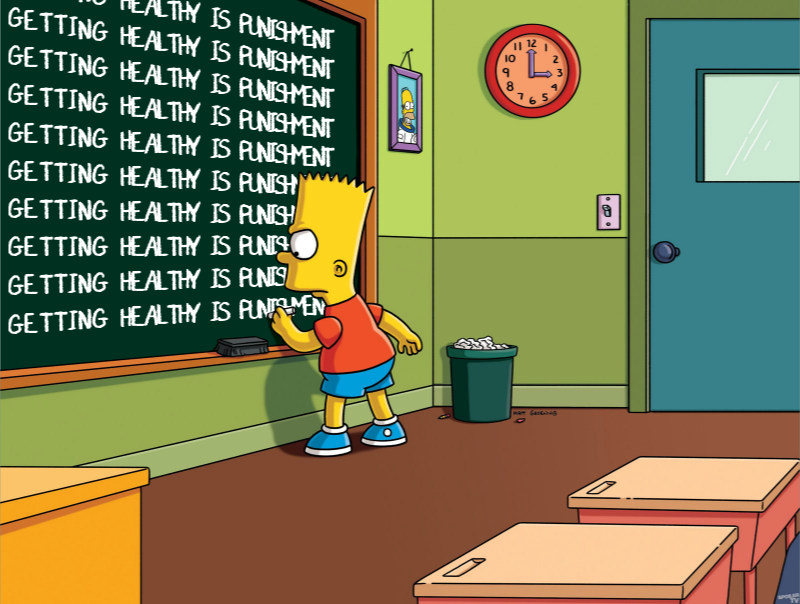Why are you moving, eating, or sitting? Run for the carrot, not away from the stick
This is my first “Substack First” post on this blog. I thought I might start writing where someone might actually, you know, see it. JIM D
It sounds absurd, but it really is a thing. People punish themselves by getting healthy. You would think that getting fit or eating cleaner is a gift you give yourself (and it should be!) that makes you happier. But too often it is trying to fill a hole in the soul that can’t be filled with a wellness addiction.
Healthy Eating as Punishment?

You’ve probably heard of serious disorders like anorexia or bulimia. How about “orthorexia?” In “Health Food Junkies: Orthorexia Nervosa: Overcoming the Obsession with Healthful Eating” (2004) by Steven Bratman MD (Amazon), Dr. Bratman describes how “clean eating” obsessions lead to increasingly restrictive diets can ruin a life. Like so many modern disorders, it’s partially based on faulty information from “influencers” rather than science. But more importantly trying to silence the inner voice that says, I’m not good enough! I have to go harder! I definitely met people with this disorder when I was getting certified as a Health and Wellness Coach.

Instead of punishing diets, try Intuitive Eating instead. It actually works, and I’ve written about it before. Instead of a cycle of deprivation and guilt, intuitive eating is an internal process of reconnecting with the body’s sensations and innate wisdom. You learn to notice your hunger, feel your fullness, and make food choices based on what truly satisfies you physically and mentally. While dieting focuses on controlling weight through willpower, leading to a strained relationship with food, intuitive eating fosters body trust and a peaceful, sustainable approach to eating for overall well-being.
The Gym Beatings Will Continue Until Moral Improves

Unlike eating disorders, exercise disorders seem to hit men and women equally, they say. In common with eating disorders, however, there is moralized language around it. This has been studied. “I was good, I hit the gym three times this week,” or “I was bad and only did a light walk today.”
How about exercise obsession? “Anorexia Athletica & Hypergymnasia: When Exercise Becomes an Obsession” (2016) by Stephanie Eissinger (Amazon).I also met people leaning towards this disorder while I was getting certified as a Personal Trainer. You yourself might see them hanging out in the gym a lot. As you can imagine, this is pretty much the same thing. Besides the self-disgust that motivates people like this, all of these disorders are driven by an overwhelming sense of being out of control, and fighting to regain it.
Okay, listen, your habits don’t make you inherently “good” or “bad.” Your healthy habits will not get you into Wellness Heaven. That is just messed-up pseudo-religious thinking. There is what you were doing in the past or now, and what you’d like to be doing instead in the future. No judgment.
When Is Wellness Too Much?
I’ve written about how wellness for me was, indeed, a way to feel empowered when life was getting me down (Captain of your Own Ship). Perhaps it’s a matter of degree, but for me, starting to look after my health was a way to start feeling better about myself. It was a gift to myself, because I felt I deserved better than what life was dishing out.
I’m better, but not perfect. I’m not really interested in perfect. That is a) too much work to really aim for, and b) literally impossible. Better is good enough! And since I started this path, I’ve wanted to help others take that ride.
What is needed is self-compassion. When I was teaching Buddhist practice and philosophy, I’d have students for one-on-one advice. They would treat it like “confession,” complaining about how they are not sitting, studying, or keeping their ethics very well. I’d say, “Stop. Would you judge any person as harshly as you are judging yourself right now?” No, of course not. Go easy on yourself.
Self-compassion, as pioneered by researcher Kristin Neff (Amazon), offers a radical alternative to the critical and punitive mindset that dominates diet and fitness culture. Neff defines self-compassion as treating oneself with the same kindness, care, and support one would show a friend, especially during times of failure or difficulty. Applying this to wellness means that when one “fails”—such as skipping a workout or overindulging—the response is not harsh self-criticism and a punitive plan to “get back on track,” but rather an understanding and supportive inner dialogue. Cut yourself some slack, and plan to do better next time. You’re human.
Run for the Carrot, not Away from the Stick

Basic motivation thinking is that we run from pain and seek pleasure. Pleasure is definitely better than pain, right?
So, don’t go on that path of better wellness because you think you’re garbage and deserve to be punished. Go on it because you know you’re doing the best you can right now, and want to give yourself the gift of doing a little better, BECAUSE YOU DESERVE IT!
Don’t think you deserve it? Go see a shrink — seriously. Talk about it. Get that BS out of your head and don’t let it drive you. If you do think that maybe you deserve better than you’re getting out of life at the moment, then get a Certified Health and Wellness Coach, or Personal Trainer.
I know a guy. . .
